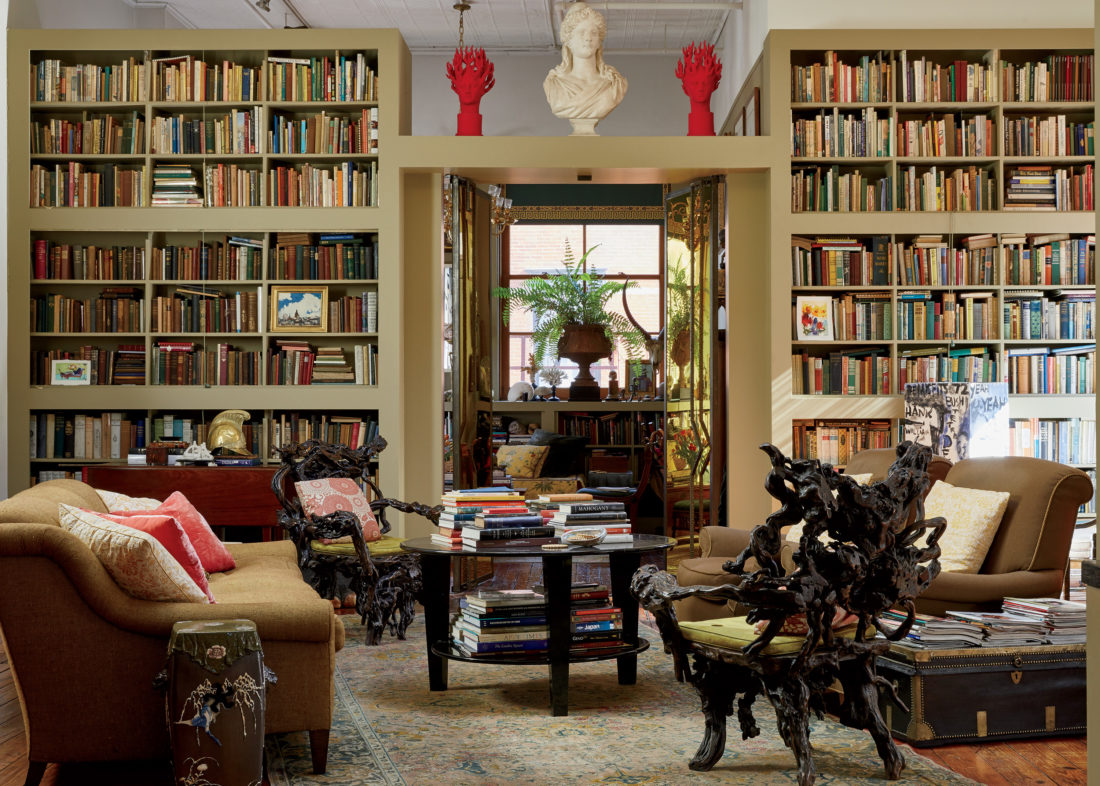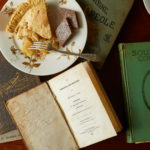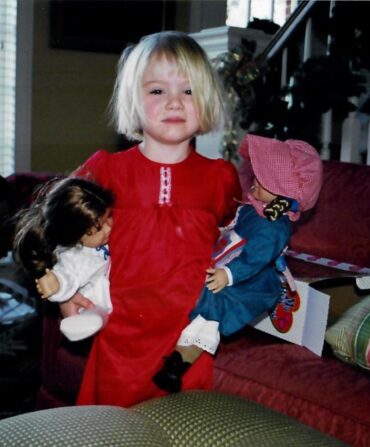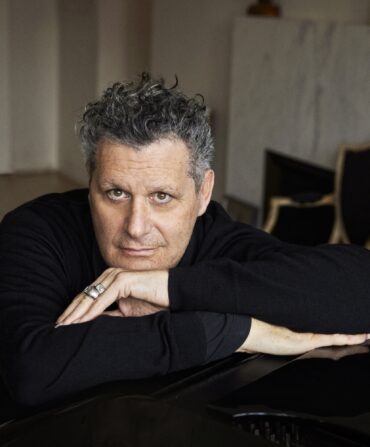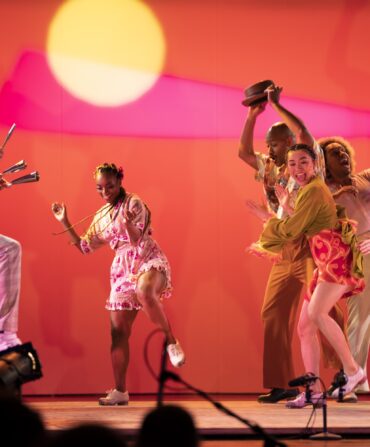Richmond (Rick) Ellis is standing in the kitchen in his New York City loft holding a book in his hands. It is small, musty, and browned with age.
The book is a first edition of La Cuisine Creole, an 1885 collection of recipes from New Orleans chefs and housewives compiled by the journalist Lafcadio Hearn. It is one of the most important cookbooks in the history of American cookery, among the first to codify a distinctly American type of cuisine. Ellis got the book back in 1987, a gift from his future husband, the renowned New York interior designer Thomas Jayne. “This one kind of kick-started this whole thing,” says Ellis, pointing to his collection of several hundred rare and unpublished Southern cookbooks dating from the eighteenth century to now.
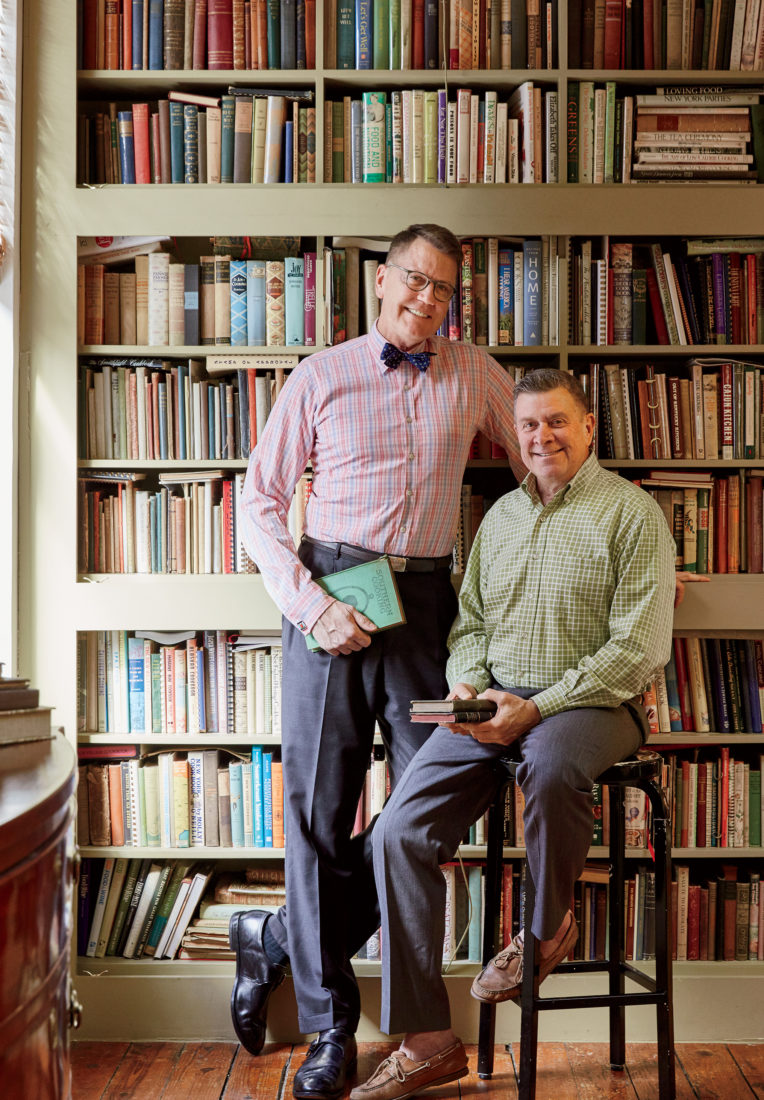
Photo: Kate Sears
Rick Ellis (right) with his husband, Thomas Jayne, in front of shelves designed for his cookbook collection.
Ellis’s Southern cookbook collection, which is part of his assemblage of some five thousand cookbooks, may be unrivaled. “To my knowledge, there is no private collection of Southern cookbooks in the world that has the breadth and depth and importance of Rick’s,” says Jessica B. Harris, a prominent culinary historian and author.
Among the standouts: an early edition of The Virginia Housewife, by Mrs. Mary Randolph, originally published in 1824 and considered the first truly American cookbook. It includes the country’s first recorded recipe for macaroni and cheese and, perhaps, the last recorded recipe for oyster ice cream. (The first cookbook actually printed in the United States was The Compleat Housewife, reproduced by William Parks in 1742, but it merely collected English recipes.)
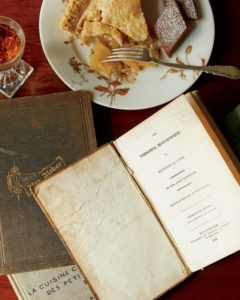
Photo: Kate Sears
An early copy of The Virginia Housewife.
Ellis also has a first edition of The Creole Cookery Book, which was edited by the Christian Woman’s Exchange of New Orleans and printed in the same year as Hearn’s, proof that something identifiable was bubbling up in that region at the time. And then there is a first edition of Southern Cooking, a 1928 book by Mrs. S. R. Dull, an Atlanta-based columnist known as the “godmother of Southern cooking.” Her cookbook was the first true compendium of authentic recipes from all over the South.
The library also contains carefully selected contemporary cookbooks from authors such as Donald Link, John T. Edge, and Julia Reed. “We wait to see what settles down as important,” Ellis says. “And then we look for a first printing.”
Perhaps the rarest book in Ellis’s collection is What Mrs. Fisher Knows about Old Southern Cooking, published in 1881. Abby Fisher, a former slave, moved to San Francisco after the Civil War and opened a catering business. She was illiterate, but her friends and clients were so enamored of her cooking that they recorded recipes and published the book for her. It was believed to have been the first cookbook published by an African American, until 2001, when historians found A Domestic Cook Book, published in 1866 by a free black woman named Malinda Russell. That book is Ellis’s holy grail. “I know of only one other in existence, and it’s part of a public collection,” he says.
Ellis grew up on the coasts of Virginia and North Carolina, the son of a marine. He cooked frequently with his mother, who was self-taught and specialized in such local Southern fare as blue crabs. He studied architecture at the University of Virginia and then moved to New York City, where, he says, “I fell into the food world at the right time.”
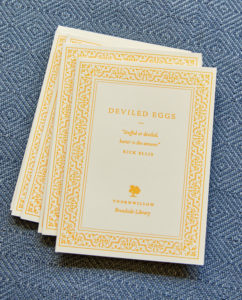
Photo: Kate Sears
Copies of Ellis’s award-winning deviled eggs recipe.
Ellis began his career as a caterer, and then became a well-known food stylist, working on projects as diverse as the movie The Age of Innocence and television ads for Burger King. (He is quite the cook himself; his deviled eggs recipe won a 2004 contest sponsored by the Southern Foodways Alliance, a group he’s been affiliated with since nearly its beginning.) Ellis’s cookbook collecting began rather innocently in the mid-1980s, when he started buying books from the 1950s and ’60s. “At flea markets, I saw books with titles like Saucepans & the Single Girl,” he says. “They were a hoot, and I could get them for a quarter apiece.”
And then Jayne presented him with La Cuisine Creole, which got him hooked on Southern cooking, the richest vein in American cookery. Soon Ellis was meeting with dealers, canvassing street fairs and the Internet, enlisting Jayne and friends as scouts, and traveling as far as Paris for book auctions. “Suddenly I realized that I had almost three times as many cookbooks from the South as I did from any other region,” he says. “I managed to put together the bulk of my collection before people started to recognize Southern cooking as perhaps the first true American cuisine. There is no way I could afford my library now.”
The cookbooks define the couple’s living space, which Jayne designed. “We moved into this loft for the books,” Jayne says. “The bookshelves serve as the architecture, dividing the loft into Whartonian rooms.” (Ellis and Jayne have a second home, a nineteenth-century apartment, in New Orleans.)
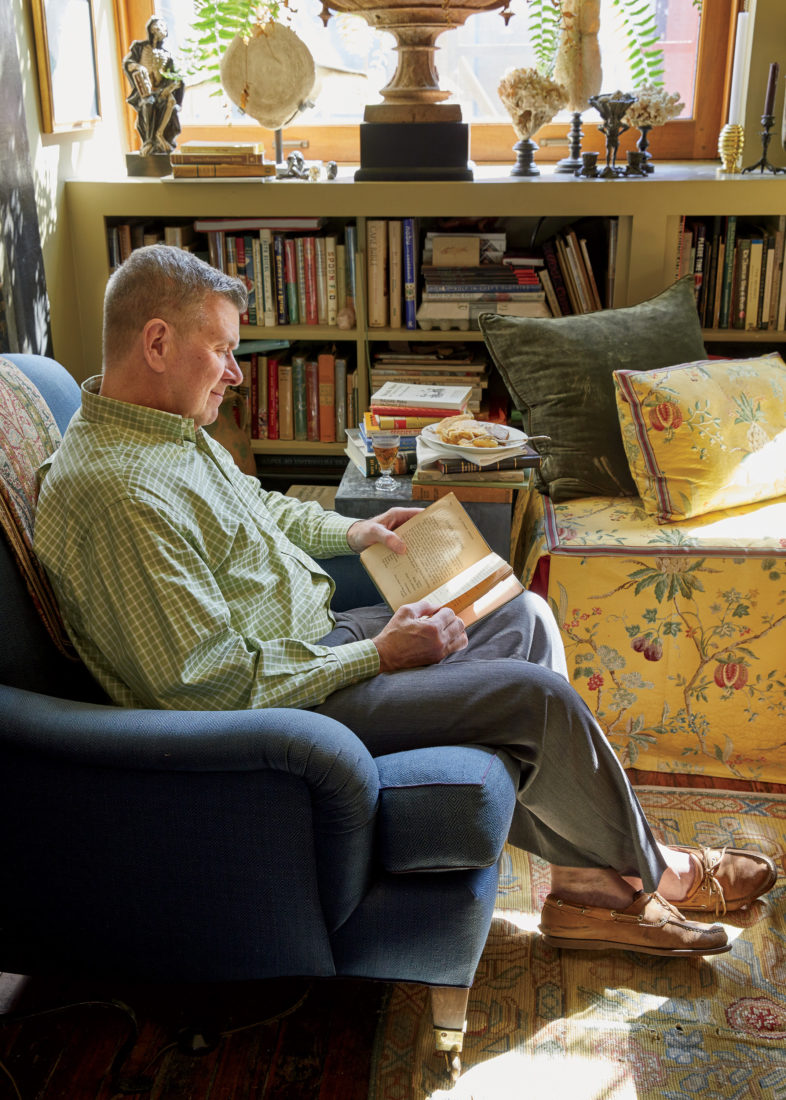
Photo: Kate Sears
Ellis at home.
Ellis has used some of his cookbooks in his job, researching old recipes for shoots. But he has collected them mostly because, he says, “they are social documents.” The history of the South—and the United States, to a degree—can be traced through them. In The Virginia Housewife, one can see a young nation starting to assert its own identity. The cookbooks written by African American women after the Civil War provided some overdue recognition for the vast influence of African American cooks. Dull’s Southern Cooking, written between the two world wars, “signifies a desire to preserve some form of Southern culture,” Ellis says. The 1950s and ’60s saw many books designed to be sold to tourists, some of them written in a faux African American dialect (so-called “Mammy”cookbooks). Some historians view these books as pejorative, others as homage. Either way, they embody some of the confusing duality of the civil rights era. And the contemporary books, written by chefs who have traveled the world, acknowledge the ever-evolving global influence in Southern cooking.
Ellis says he continues to collect, “but I’m more selective now,” acquiring two or three rare books a year. He has no immediate plans for his collection. For now, he just likes having them around, though he rarely uses them for cooking (he has copies of his favorites for when he does want to use them). One of those favorites is Cooking in Old Créole Days (1904), by Célestine Eustis, an early acknowledgment of the role of the African American cook in the South. On one of its pages, there is a big greasy thumbprint, left by a former owner. “One of the interesting things about collecting cookbooks is that condition doesn’t really matter as long as all of the pages are there,” Ellis says. “They were used. They have food stains and notes in them. They are truly living history.”


